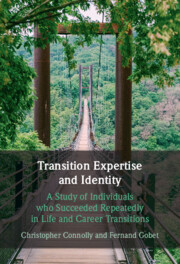 Transition Expertise and Identity
Transition Expertise and Identity Book contents
- Transition Expertise and Identity
- Transition Expertise and Identity
- Copyright page
- Dedication
- Contents
- Figures
- Tables
- Preface
- Acknowledgments
- Chapter 1 Introduction
- Part I Transitions
- Part II Transition Expertise
- Chapter 5 Cognitive Flexibility
- Chapter 6 Generative Intelligence
- Chapter 7 Personal Intelligences
- Chapter 8 Contextual Intelligence
- Part III Motivation
- Part IV The Project of the Self
- Appendix 1 Methodology
- Appendix 2 Nontransitions
- References
- Index
Chapter 8 - Contextual Intelligence
Utilizing the Environment in Transitions
from Part II - Transition Expertise
Published online by Cambridge University Press: 30 May 2024
- Transition Expertise and Identity
- Transition Expertise and Identity
- Copyright page
- Dedication
- Contents
- Figures
- Tables
- Preface
- Acknowledgments
- Chapter 1 Introduction
- Part I Transitions
- Part II Transition Expertise
- Chapter 5 Cognitive Flexibility
- Chapter 6 Generative Intelligence
- Chapter 7 Personal Intelligences
- Chapter 8 Contextual Intelligence
- Part III Motivation
- Part IV The Project of the Self
- Appendix 1 Methodology
- Appendix 2 Nontransitions
- References
- Index
Summary
This chapter draws upon and integrates aspects of two well-researched hybrid models of intelligence: practical intelligence and social intelligence. Contextual intelligence addresses how individuals interact with their environment. Contextual intelligence in transitions operates in three main categories: (1) identifying environmental resources such as physical resources, enabling environments, education and training, or team resources; (2) identifying knowledge experts such as peers and mentors or external knowledge experts and stakeholders, who provide expert domain knowledge in diverse fields; and (3) understanding of the cultural and social milieu into which one is moving, whether this be understanding the cultural climate, accessing culturally embedded knowledge, using the right language, or ultimately navigating the politics of the new arena. Retrospective interviews with twenty-four elite performers in three domains (business, sports, and music) are used to investigate how contextual intelligence is used to successfully and repeatedly transition to higher positions within their field.
Keywords
- Type
- Chapter
- Information
- Transition Expertise and IdentityA Study of Individuals Who Succeeded Repeatedly in Life and Career Transitions, pp. 145 - 172Publisher: Cambridge University PressPrint publication year: 2024
